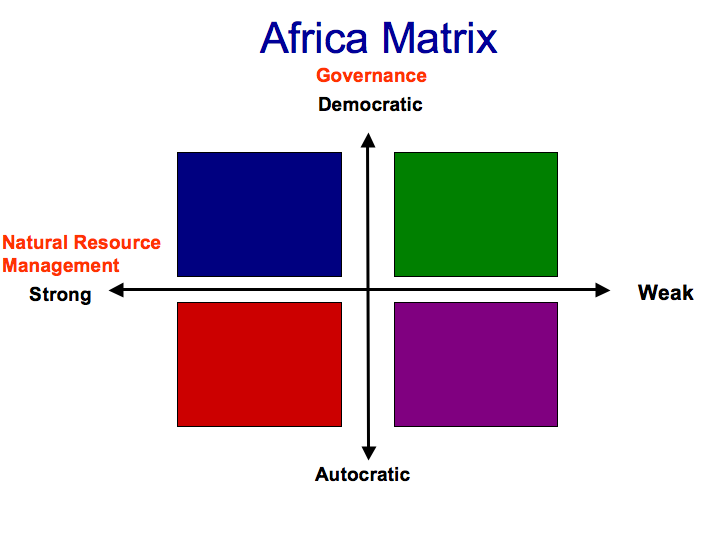 Here’s a draft matrix produced for an Africa in 2030 project for Save the Children (a pro bono project). So we now need to pick a few brains. First, if anyone out there is interested in Africa we’d love to pick your brain. Second, if you are a scenario planner, especially someone based in Africa or someone that’s been involved in scenarios in the region we’d also love to hear from you.
Here’s a draft matrix produced for an Africa in 2030 project for Save the Children (a pro bono project). So we now need to pick a few brains. First, if anyone out there is interested in Africa we’d love to pick your brain. Second, if you are a scenario planner, especially someone based in Africa or someone that’s been involved in scenarios in the region we’d also love to hear from you.
Here’s the list of possible drivers from the workshops:
Democracy versus autocracy
Quality of education
Internal versus outward mindset (fragmented or not?)
Tribalism
Social equality
Male/female balance
Economic growth
Population (is this uncertain?)
Food
Electricity
Water
Migration/population movement
External influence (source?)
Influence of China
Employment
Infrastructure
Phone/internet penetration
Governance (see democracy v autocracy)
Inward flow of investment
Security (physical)
Debt
Intervention (development v humanitarian)
Climate Change
HIV/AIDS
Urbanization
Strength of Africa Union
Malaria
Aid flows
Our first matrix (not shown) set autocratic and democratic against an inward versus outward mindset (engagement with rest of the world high versus low) but my feeling was (still is) that one flows from the other.
The second matrix (also not shown) featured climate change (worse than expect versus better than expected) against the same democracy/autocracy axis.
Any thoughts? Personally I think the wording of Natural Resource Management is wrong or is at the very least ambiguous. Perhaps a better phrase would be something like stewardship of natural resources (selfishly squandered v equitably managed – or perhaps ordered v turbulent?).
Then again perhaps we should just name the axis Resources & the Natural Environment and have an axis based around stability v chaos?).
Views please!

With regard to “inward versus outward mindset”, I certainly notice the absence of “Diaspora”. There’s also no mention of “Politics” (rather than “Governance”) and “Policy”, which usually indicates a neo-liberal mindset that just now is getting discredited by applying the same measures to European countries that have been applied to Africa for years (“Structural adjustment”, etc.). With regard to “Democracy versus autocracy”, that’s the usual unhelpful simplification. See my post here on some initial findings of the “Africa Power and Politics Programme”: https://plus.google.com/u/0/109507108125539761871/posts/h1Mjj6tBVWq
“Quality of education”: does this refer to primary, secondary, or tertiary education? There are problems at all levels, but tertiary education lacks most because so much funders focus on primary education. Also, “Religion” is completely missing, including “Religious conflict”, i.e. Islam versus Christianity. Actually, “War” and “Conflict” are not listed at all! In that vein, you also have to think of “Border disputes” (and water disputes). I presume “Infrastructure” includes things like roads or direct flights between African nations (not via Paris or London)? “Public administration” and bureaucracy. “Tax burdens” that are among the highest in the world.
Thanks Erich, that is seriously useful. Neo-Liberal mindset? Guilty! BTW, anyone helping with this will be given a name check in the final report, which ,of course, will be public domain. Thanks again.
Certainly economy needs to be central to the axis other than governance. I’m not convinced that to 2030 resources will be central to that – I’d hope not entirely. Education is fundamental, though fairly tied to governance. I think the phrase ‘NRM’ is OK for what it’s intended to mean, but this should be about more than resources. Surely?